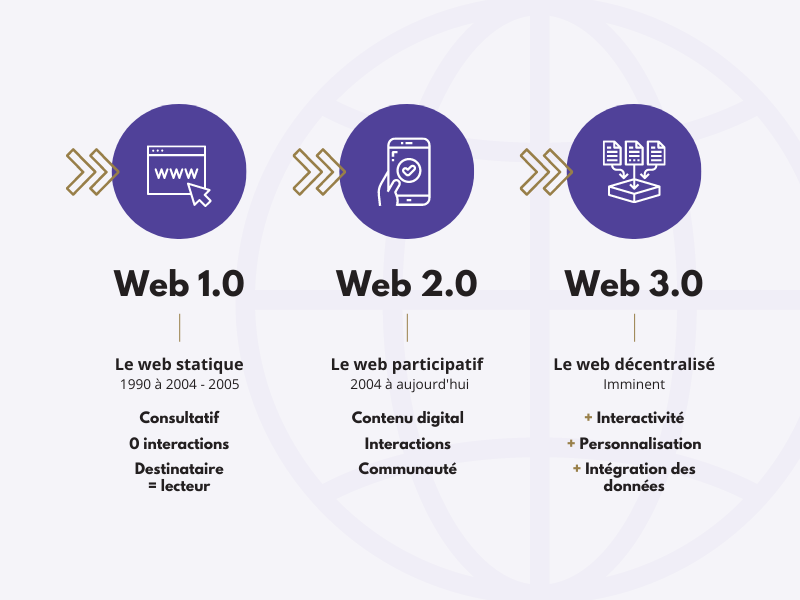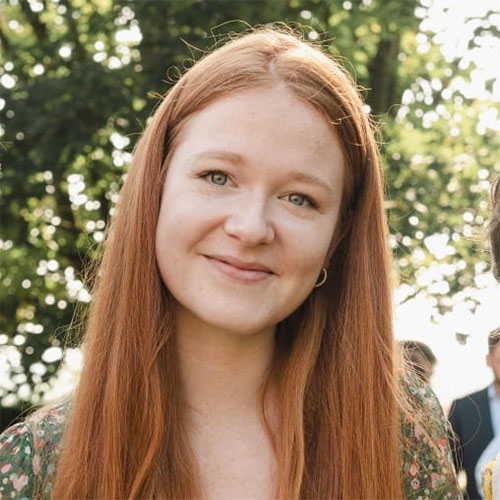Why are we talking about Web 3 (or Web 3.0)? And why is it so interesting for the future of companies with a digital product?
If you run a business, if you’re concerned about growing your turnover and if you value your content (and you should!), Web 3.0 has to be at the heart of your preoccupations. Some people, like Elon Musk, are sceptical about this new idea of the web. However, we advise you to remain alert to this new generation of the web, which could seduce many Internet users.
Blockchains, artificial intelligence or crypto: what is Web 3.0?
Web 3.0 is the third generation of web services and applications. It is the latest addition to the family, and unlike its two predecessors, it is characterised by greater interactivity, greater customisation and better data integration. To help you understand how it could change everything in your strategy, here’s a brief history of the web.

Web 1.0: the static web (1990 to 2004-2005)
This first generation is mainly consultative and devoid of any major interaction for Internet users. Its main use is to adapt real content for the virtual world, and to offer users the opportunity to consult it. In other words, the information is unidirectional and comes from the creator to the reader.
Web 2.0: the participative web (2004 – today)
With the arrival of web 2, content is created by the individual for the individual. It’s the emergence of blogs (remember the golden age of skyrock, don’t you?). This was the age of communities. We saw the development of forums, recommendation platforms and our famous social networks. People no longer went online just to get an answer, but to meet, exchange and develop ideas. A few big names controlled the digital space: Facebook, Twitter, the GAFAMs, etc. The web is centralised around these major players.
Web 3.0: the decentralised web
There is much discussion and concern about the future of the web. These include giving consumers – but also content creators – back control over their data and actions online.
When we talk about the idea behind Web 3.0, key words such as blockchain, AI, cloud, VR, IoT, cryptocurrencies and decentralised apps come to mind. But what does web3 really entail?
Web 3.0 is a response to the current excesses of the Internet. We aspire to trust and values. The focus is more on the user. With this new generation, the aim is to offer an even faster, more secure and ultra-personalised user experience. This internet technology exploits I.A.,machine learning (including algorithms) and blockchain. The aim is to develop websites and apps that are open, connected to users and intelligent thanks to the semantic web.
Machines are then able to recommend personalised content more quickly and intuitively understand the content created and desired by a single target. In short, we will see the emergence of websites that adapt to each user’s information, just as a salesperson would adapt to his or her customer in the real world.
According to Gavin Wood, creator of the term “Web 3.0”, this new generation should correspond to “an ocean of decentralised information, managed by the blockchain, available to websites and applications for use with individual users”.
The protagonists of this new movement are looking for a “decentralised” web, i.e. one that is uncontrolled and grouped exclusively around the major digital players, the stars of Web 2.0 #zuckerberg.

What’s more, Web 3.0 advocates user control. This would guarantee better data protection because anonymity would be better preserved. The aim is to share ownership of this new generation of the web between those who build and use it. This directly echoes the NFT movement. These digital works are held by owners and their value is encrypted.
In concrete terms, why should Web 3.0 be of interest to company directors, digital marketers and developers?
More efficient search engines
Thanks to the semantic web and metadata, users will have a more convenient browsing experience. Add to this the interconnection of information, and you have more data relating to products sold on the internet. The impact of this is to provide them with more data to connect them to the specific needs of a user.
Better ads, agile marketing strategies and sharp data protection
In the same way as search engines, the semantic web, A.I. and the hyper-connectivity of data will enable marketing ads to be increasingly relevant to each user. In fact, if every ad you receive corresponds to your current needs, online advertising will become a useful everyday tool, rather than a source of constant frustration.
And let’s not forget the end of third-party cookies, which is worrying digital marketers the world over. Yet when it comes to marketing in the Web 3.0 era, data will be essential thanks to blockchain. Artificial intelligence will complement this need, enabling marketers to reach the right target in a personalised way.
High-performance customer service
Finally, customer support is still a major obstacle for companies with digital products. It complements the UX experience of users and can help build loyalty among your target audience. Among the solutions advocated by Web 3.0, more intelligent and effective chatbots could help to guarantee genuinely useful support agents. These innovations are already underway and continue to evolve.
Are we there yet?
Indeed, the initial premise seems to be very complimentary for tomorrow’s users. Be that as it may, these two initiatives are still in their infancy and reflect opposing ideologies and divergent opinions, like Elon Musk, discrediting this new generation.
What’s more, another technological arrival is responding to this desired new generation of Internet: the Metaverse.
The Metaverse is a response to the philosophy of Web3, which advocates a more transparent and intelligent web, but it comes directly from the centralised giants of Web2, who are investing heavily in the future of this technology. And the proof is in the pudding: everyone is talking about it! Will the future of the Internet be made up of a dichotomous mix of the two movements? Or will the Metaverse slow down the implementation of Web 3 solutions?

Conclusions: our comments on the question
Whether you’re convinced or sceptical, like Elon Musk, about the arrival of this new generation, the web continues to evolve constantly, and it’s important to keep abreast of new trends and technologies.
One thing is certain: we are gradually entering an era where the individual consumer is at the forefront. From now on, every initiative, whether marketing or development, must be based on personalisation. A strategy aimed at personalising your offers as much as possible is possible thanks in particular to the advances made in the field of artificial intelligence, which should now become your best ally.

Social media expert, Marie is part of our e-marketing team. Creative and always looking for the latest trends, she shares with you her knowledge and mastery of Facebook, Instagram, Tik Tok, Pinterest and other social media algorithms!



